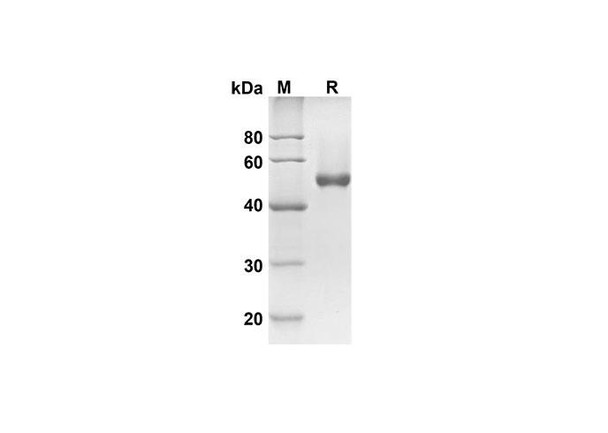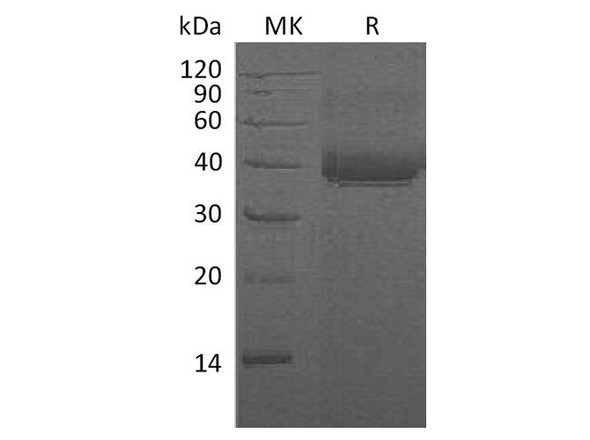Recombinant Human CD23 Protein ( Fc Tag) (RPES8256)
- SKU:
- RPES8256
- Size:
- 20μg
- Tag:
- C-Fc
- Reactivity:
- Human
- Expression Host:
- Mammalian
- Accession:
- P06734
Description
| Product Name: | Recombinant Human CD23 Protein ( Fc Tag) |
| SKU: | RPES8256 |
| Size: | 20μg |
| Tag: | C-Fc |
| Reactivity: | Human |
| Expression Host: | Mammalian |
| Accession: | P06734 |
| Sequence: | Met150-Ser321 |
| Calculated Molecular Weight: | 43.8 kDa |
| Observed Molecular Weight: | 50 kDa |
| Synonyms: | Blast 2, BLAST-2, Blast2, C type lectin domain family 4 member J, C-type lectin domain family 4 member J, C-type lectin domain family 4, member J, CD 23, CD 23A, CD23, CD23 antigen, CD23A, CLEC 4J, CLEC4J, Fc epsilon receptor II, Fc epsilon RII, Fc fragment of IgE low affinity II receptor for, Fc fragment of IgE receptor II, Fc fragment of IgE, low affinity II, receptor for (CD23), Fc of IgE, low affinity II, receptor for (CD23), Fc receptor IgE low affinity II alpha polypeptide, Fc receptor, IgE, low affinity II, alpha polypeptide, isoform CRA_a, Fc-epsilon-RII, FCE 2, FCE2, FCER 2, Fcer2, FCER2, FCER2A, FceRII, IgE binding factor, IgE receptor lymphocyte, IgE-binding factor, IGEBF, Immunoglobulin E binding factor, Immunoglobulin E receptor, low affinity II, Immunoglobulin E-binding factor, Immunoglobulin epsilon chain, LEUKOCYTE ANTIGEN CD23, Low Affinity IgE Receptor, Low affinity immunoglobulin epsilon Fc receptor, Low affinity immunoglobulin epsilon Fc receptor membrane bound form, Low affinity immunoglobulin epsilon Fc receptor soluble form, Ly-42, Ly42, Lymphocyte antigen CD23, Lymphocyte IgE receptor, MGC93219 |
| Endotoxin: | < 1.0 EU/mg of the protein as determined by the LAL method |
| Purity: | > 90% as determined by reducing SDS-PAGE. |
Fc fragment of IgE, low affinity II, receptor for (CD23) or CD23 antigen is a member of the cluster of differentiation family. The cluster of differentiation (cluster of designation) (often abbreviated as CD) is a protocol used for the identification and investigation of cell surface molecules present on white blood cells initially but found in almost any kind of cell of the body, providing targets for immunophenotyping of cells. Physiologically, CD molecules can act in numerous ways, often acting as receptors or ligands (the molecule that activates a receptor) important to the cell. A signal cascade is usually initiated, altering the behavior of the cell (see cell signaling). Some CD proteins do not play a role in cell signaling, but have other functions, such as cell adhesion. CD23/FCER2 is a B-cell specific antigen, and a low-affinity receptor for IgE. It has essential roles in B cell growth and differentiation, and the regulation of IgE production. This protein also exists as a soluble secreted form, then functioning as a potent mitogenic growth factor. Increased levels of soluble CD23/FCER2 cause the recruitment of non-sensitised B-cells in the presentation of antigen peptides to allergen-specific B-cells, therefore increasing the production of allergen specific IgE. IgE, in turn, is known to upregulate the cellular expression of CD23 and Fc epsilon RI (high-affinity IgE receptor).
| Bio-activity: | Not validated for activity |
| Formulation: | Lyophilized from a 0.2 μm filtered solution in PBS with 5% Trehalose and 5% Mannitol. |
| Reconstitution: | It is recommended that sterile water be added to the vial to prepare a stock solution of 0.5 mg/mL. Concentration is measured by UV-Vis. |
| Storage: | Generally, lyophilized proteins are stable for up to 12 months when stored at -20 to -80℃. Reconstituted protein solution can be stored at 4-8℃ for 2-7 days. Aliquots of reconstituted samples are stable at < -20℃ for 3 months. |
| Shipping: | This product is provided as lyophilized powder which is shipped with ice packs. |






